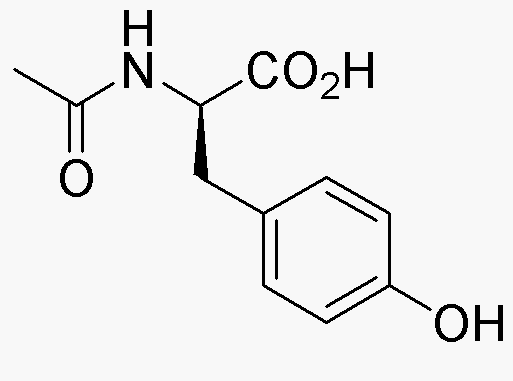Acetyl-D-tyrosine is widely utilized in research focused on:
- Protein Synthesis: This compound serves as a building block in peptide synthesis, aiding researchers in creating specific proteins for studies in biochemistry and molecular biology.
- Neurotransmitter Research: It plays a role in the synthesis of neurotransmitters, making it valuable for studies related to brain function and disorders, particularly in understanding dopamine pathways.
- Pharmaceutical Development: Acetyl-D-tyrosine is used in drug formulation, especially in developing treatments for neurological conditions, enhancing bioavailability compared to other amino acids.
- Antioxidant Studies: Its antioxidant properties make it a subject of interest in research aimed at combating oxidative stress, which is linked to various diseases.
- Dietary Supplements: The compound is incorporated into nutritional products aimed at improving cognitive function and supporting mental health, appealing to health-conscious consumers.
Información general
Propiedades
Seguridad y normativas
Aplicaciones
Acetyl-D-tyrosine is widely utilized in research focused on:
- Protein Synthesis: This compound serves as a building block in peptide synthesis, aiding researchers in creating specific proteins for studies in biochemistry and molecular biology.
- Neurotransmitter Research: It plays a role in the synthesis of neurotransmitters, making it valuable for studies related to brain function and disorders, particularly in understanding dopamine pathways.
- Pharmaceutical Development: Acetyl-D-tyrosine is used in drug formulation, especially in developing treatments for neurological conditions, enhancing bioavailability compared to other amino acids.
- Antioxidant Studies: Its antioxidant properties make it a subject of interest in research aimed at combating oxidative stress, which is linked to various diseases.
- Dietary Supplements: The compound is incorporated into nutritional products aimed at improving cognitive function and supporting mental health, appealing to health-conscious consumers.
Documentos
Hojas de datos de seguridad (HDS)
La SDS proporciona información de seguridad completa sobre la manipulación, el almacenamiento y la eliminación del producto.
Especificación del producto (PS)
La PS proporciona un desglose completo de las propiedades del producto, incluida la composición química, el estado físico, la pureza y los requisitos de almacenamiento. También detalla los rangos de calidad aceptables y las aplicaciones previstas del producto.
Certificados de análisis (COA)
Busque certificados de análisis (COA) ingresando el número de lote del producto. Los números de lote y de partida se pueden encontrar en la etiqueta de un producto después de las palabras "Lote" o "Lote".
Número de catálogo
Número de lote/lote
Certificados de origen (COO)
Este certificado de origen confirma el país en el que se fabricó el producto y también detalla los materiales y componentes utilizados en él y si se deriva de fuentes naturales, sintéticas u otras fuentes específicas. Este certificado puede ser necesario para cumplir con las normativas aduaneras, comerciales y regulatorias.
Número de catálogo
Número de lote/lote
Hojas de datos de seguridad (HDS)
La SDS proporciona información de seguridad completa sobre la manipulación, el almacenamiento y la eliminación del producto.
DownloadEspecificación del producto (PS)
La PS proporciona un desglose completo de las propiedades del producto, incluida la composición química, el estado físico, la pureza y los requisitos de almacenamiento. También detalla los rangos de calidad aceptables y las aplicaciones previstas del producto.
DownloadCertificados de análisis (COA)
Busque certificados de análisis (COA) ingresando el número de lote del producto. Los números de lote y de partida se pueden encontrar en la etiqueta de un producto después de las palabras "Lote" o "Lote".
Número de catálogo
Número de lote/lote
Certificados de origen (COO)
Este certificado de origen confirma el país en el que se fabricó el producto y también detalla los materiales y componentes utilizados en él y si se deriva de fuentes naturales, sintéticas u otras fuentes específicas. Este certificado puede ser necesario para cumplir con las normativas aduaneras, comerciales y regulatorias.


